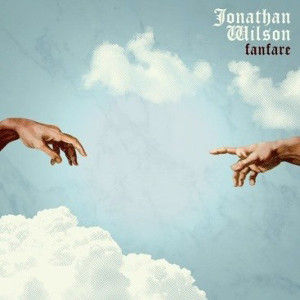Jonathan Wilson waited until he was well into this 30s to release his first solo album, 2011’s Gentle Spirit. The most famous so-called ‘late bloomer’ must be Leonard Cohen (first album at 32) with more recent examples of fine first records at a more advanced age than most in the singer-songwriter realm being Elvis Perkins and Harper Simon. With Wilson, as with those guys, this fact allows certain things to adorn his music: there is a gentleness that comes from making a first record without any particular urgency to prove one’s worth, and a pleasant relaxedness and comfort in the fact his influences are so obvious as to occasionally veer into imitation. As well, age brings into focus the rare pleasure that is making music for a living. On Gentle Spirit and now Fanfare, there exudes the sense of a man truly blissed-out with the fact he is able to do his favourite thing: archetypal Californian folk-rock.
Gentle Spirit was an impressive record punctuated by a few dull instrumental passages and a streak of sentimentality. Fanfare is an improvement if just for the fact it doesn’t clout you round the head with its motifs with quite the same conviction: Gentle Spirit‘s ‘Desert Raven’ and ‘Magic Everywhere’ were great songs, yet the former’s guitar riff and latter’s chorus were ruthlessly worn out. Fanfare offers restraint in not riding a song’s central idea so hard, but also plenty of ambition – songs are consistently pushed to new places here, instead of digging further into the ground already hoed, as on Gentle Spirit.
It cannot go unmentioned that Wilson has recruited a bunch of his heroes for this. Graham Nash, David Crosby, Jackson Browne and Roy Harper are the big ones (J.Tillman is also involved), with Nash and Crosby combining on the moody ‘Cecil Taylor’ arguably more beautifully than they have on any CSN material from the last decade or so. This fascinating song also bears strong marks of Harper’s Stormcock with its toying with echo effects on the vocals – possibly the spill-over of Wilson recording with some aplomb the recent Roy Harper album Man & Myth.
In fact, Wilson has managed the considerable trick of sounding like each individual member of Crosby, Stills, Nash and Young in their solo work. The spirit of Crosby’s acoustic psychedelia pervades the magnificent ‘Her Hair Is Growing Long’, while ‘Moses Pain’, a mournful anthem, could have been from one of Stephen Stills’ albums with Manassas. The romantic schmaltz of Nash is channelled on the self-titled opener (though the vocals here, low and shaky, are pure Dennis Wilson on Pacific Ocean Blue). The most glaring homage, however, comes on ‘Illumination’, actually hugely convincing and brilliantly produced with its sublime layers of fuzzy, unkempt guitar but so obviously a refit of ‘Dangerbird’ from Neil Young’s Zuma as to prove that Wilson is making a deliberate tribute.
‘Illumination’, in its changes of pace and apparent improvisation, comes across as a centrepiece of Fanfare. Another ‘big’ track, possessing the same sort of gravitas as Gentle Spirit‘s ‘Desert Raven’ (itself a direct cousin of David Crosby’s ‘Cowboy Movie’), is ‘Dear Friend’, another one that takes plenty of unexpected turns, something that Gentle Spirit simply did not do.
Wilson’s interesting tangents on Fanfare, it must be said, are all done within reason. He never looks too far beyond Laurel Canyon. And in fact, in some ways the album’s sound and instrumentation is actually a regression from Gentle Spirit. His debut had several alluring electronic touches to complement the soft country rock – not exactly Midlake but sensitive and well judged nonetheless – which are generally absent here, perhaps because he has the intrigue within the songwriting itself now, thus not necessitating anything beyond fairly traditional arrangements to lend the album energy. And it is that expanded awareness of what is possible within his derivative style that makes Fanfare a fascinating album, and a significant step forward.


